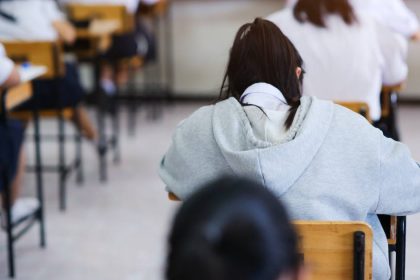I don’t believe in homework (or school reports – but that’s a soap box moment for another time).
I appear to be in the minority, but, in my humble opinion, the school work should end with the school day. Instead, Australian primary school students complete an average of six hours of homework per week – after six-hour days at school – and I’m pretty sure that, if the equivalent was consistently expected of adults in the workplace, eyebrows would be raised.
The origins of homework
When my own kids roll their eyes about completing homework, I remind them that it hasn’t actually come from me, it’s come from their teachers. But, for future negotiations, I’ll be informing them that Horace Mann is to blame.
Mr Mann was a 19th-century politician and educational reformer who was intrigued by Germany’s compulsory public education system at that time. That country’s decision to assign mandatory school work assignments to be completed at home caused a stir even then, as it was seen as a government flexing its muscles and exercising the power to control the actions of individuals in their own homes.
That could very well be what I’m reacting to all these years later, thanks to Horace Mann popularising the practice in America, where it spread like a virus. But I digress…
In 2023, public schools are required to have a homework policy available to the wider school community. The content of this policy is not regulated, and school council approval isn’t required, but it “should be evidence-informed and comprehensive, and must be developed in consultation with the school community”.
The benefits of homework
A 1987 to 2003 study by Duke scholars found that “there was generally consistent evidence for a positive influence of homework on achievement”. More for high school students than for primary school students. (In fact, Australian academics Mike Horsley and Richard Walker included international research in their 2013 publication Reforming Homework and concluded that homework has minimal value for primary school students).
The benefits of homework can be found in the lessons around autonomous working, time management, and honing study practices, with the bonus skills of improved memory techniques and the development of critical thinking.
In its simplest form, homework can be an opportunity to review what was learned in class and self-test how well that information has been absorbed and understood.
For parents, it can be a window into school life. A chance to see what’s being learned, and how, as well as what’s being excelled at, and what isn’t.
When homework doesn’t work
The case against homework in our family is mainly based on attitude and energy levels, but there are circumstances that can create real barriers to getting the work done. Students with learning difficulties, and in particular ADHD, stand out as a cohort that faces significant challenges when it comes to completing homework.
Tests and exams are less of an issue, but keeping on top of the moving parts for ongoing assignments that need to be completed outside of school can play out like an anxiety-inducing juggling act.
A good school will take steps to guide students with ADHD in staying up-to-date with their homework (so look out for support systems and goal-setting and rewards strategies). But it does raise questions about whether there are more inclusive ways of continuing the learning journey – for all – beyond the classroom.
In Reforming Homework, Horsley and Walker touch on the need for equity and inclusion in the context of “ethnic and socioeconomic diversity, special education, and learning-disabled and physically disabled students” (p. 195) and advise that schools should reassess how expectations for homework may, inadvertently, be more favourable to some students than others. Providing actionable solutions and alternative, more culturally aware, homework practices can help balance out potential disadvantages.
The post-pandemic shift
In November 2020, Anne Hollonds was appointed National Children’s commissioner and she opened with a series of strongly worded statements, probably reflective of the challenging year that preceded them.
“In our very crammed lives, and with a crammed (school) curriculum, we have to ask if there’s enough time for kids to play,’’ Ms Hollonds said.
She called for parents and teachers to “reset expectations”, noting that “we tend to load up their days, and expect schools to cram a lot into those days”.
At the time, Education Victoria recommended one to three hours of homework each night for high school students in years 10 to 12, plus six hours on weekends. It’s a policy that was reviewed in 2021 and remains in place to date. The requirements are similar at Queensland high schools, where 18 hours of extracurricular study is recommended each week.
It’s a lot. And Anne Hollonds notes that, “many people today would say kids are experiencing stress as a result of too much to do”.
The post-pandemic shift in attitudes to homework seems to signal a move towards more family time. Anne Hollonds literally said go home and “eyeball your kids”, and Flinders University primary school program coordinator Barbara Neilsen wants young students to “spend free time socialising or playing with their parents”.
Alternatives to homework
Personally, although I can see the benefit of educational activities outside of school, I just don’t think those benefits can be found in a textbook or device.
In fact, as an expat from the UK, I chose Australia because of the lifestyle that comes with this country’s climate, beaches, oceans, and parklands.
In 2016, U.S teacher Brandy Young sent her second-grade (seven and eight year old) students home with a now viral note that read, “there will be no formally assigned homework this year, rather, I ask you spend your evenings doing things that are proven to correlate with student success. Eat dinner as a family, read together, play outside, and get your child to bed early”.
I would say this is where my family sits. If we were to freely choose how we spend our weekday evenings, some would be spent on activities, some on the logistics of keeping our home running smoothly, and some specifically on the vital art of making amazing food for each other. (I’m Caribbean, that part is culture.)
Weekends? They’d be spent getting as far away from school grounds as possible, piling into the car with library and audio books for a road trip to whatever Sydney gold I’ve dug up during the week. Mooching around art galleries, tracking down obscure museums, and generally being tourists in our own city.
Finding the right fit for your family
Anne says that “play is very important for the development and wellbeing of children” and she’s right. It’s important for their parents and carers too. If homework’s a challenge for you I believe that finding the right fit for your family means ditching the “one size fits all’ approach, choosing your battles, and looking at what works for the individuals in your household.
I have three children and they each have a different relationship with school, and with their homework. One works almost completely autonomously, one loves a group effort, getting input and opinions from siblings as well as me, and one loves to avoid homework at all costs.
I may not believe in homework, but I do believe that attitude and effort matter, and this is where I tailor the experience for my kids. If I can see that the sheer volume coming home is interfering with planned extracurricular activities that school my kids in self-awareness, team dynamics, accountability, resilience, and kindness, I’ll make a call on focusing on quality rather than quantity.
I prioritise self-care in this conversation too, noting that a vital element of that self-care also involves alleviating the stress around not doing homework – by getting it done.
Much like their adult counterparts, navigating the workplace that’s 20 years ahead of them, the key for kids is to begin mastering the ever-elusive art of balance. And that means balancing workload with wellbeing, learning with life, and the urge to run wild and free with the discipline and mindset needed to run a team, department, business, or empire in their chosen field.







